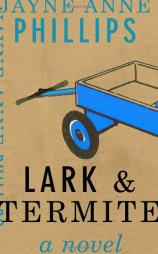Lark and Termite
Review
Lark and Termite
Thirty years along in a literary career with a modest-sized body of work to her credit, it’s fair to ask whether Jayne Anne Phillips has fully realized the potential displayed in her dazzling 1979 debut short story collection, BLACK TICKETS. With the publication of her latest novel, her first in nine years, there is a good chance she will silence any doubters and will leave all of us hungering for more of her distinctive voice.
LARK AND TERMITE is a family drama set in the 1950s in an unlikely pairing of locations --- a dying West Virginia town and a battlefield in the early days of the Korean War. The novel is built upon four interconnected points of view: 17-year-old Lark, attending secretarial school in the town of Winfield and sensing the pull of the wider world; her disabled “minimally hydrocephalic” nine-year-old brother Termite, whose stream of consciousness pours onto the page in a voiceless swirl of images and sounds; their Aunt Nonie, who has been left to care for both children after they’re deposited with her by her younger sister, Lola, a sometimes lounge singer who is irresistibly attractive to men and disastrously incapable of dealing with the consequences of that fact; and Corporal Robert Leavitt, Termite’s father, a jazz musician and young soldier from Philadelphia whose platoon accompanies South Korean villagers fleeing the North Korean onslaught.
Basing the grimly realistic Korean segments of the novel on accounts of the massacre of South Korean civilians by American troops at No Gun Ri, Phillips movingly describes the last days of Leavitt, mortally wounded by friendly fire and pinned down in an abandoned railroad tunnel, where he has sought refuge to escape strafing from North Korean aircraft. He is sustained by memories of the few months he spent with Lola before shipping off to war and is tenderly cared for by a Korean girl with a blind brother in her charge. “If death is this brilliant slide,” he thinks in language that is characteristic of Phillips’s lustrous prose, “this high, fine music felt as pure vibration, this plunging float in wind and silence, it’s not so bad.”
As Robert lies dying, Lola is about to give birth to Termite in a Kentucky hospital. And it’s that juxtaposition, only one of several such almost mystical connections (the parallel between Lark and Termite and the unnamed Korean siblings another), that gives the novel its identity. Phillips compresses the story into four days --- July 26th, 27th, 28th and 31st --- recounting events that occurred on those dates in 1950 Korea and 1959 West Virginia. That structural choice reveals a central metaphor, as Phillips repeatedly but effectively invokes the idea of mirror images. Describing Lola, she writes, “She realized little by little, and learned early to mirror back what people wanted to see.” Or this, in Lark’s description of how she believes the inexpressible way Termite sees the world differs from that of normal people: “That’s the point: he’s got a rhyme and reason. We only see the surface, like when you look at a river and all you see is a reflection of the sky.”
Phillips enfolds Lark and her brother in an intricate web of relationships. Aunt Nonie works at a local restaurant and occasionally shares the bed of her boss, Charlie. The Tucci family lives next door, stoking a persistent and frank sexual tension between Lark and one of the Tucci boys, Solly, who plays a pivotal role when Lark and Termite are driven to the attic of their house by the waters of a flood whose drama consumes much of the novel’s final act. There’s a solicitous, if mysterious, social services worker named Robert Stamble and Ervin Tompkins, one of Leavitt’s comrades, whose cameo roles bringing gifts to Termite and Lark lend emotional shading to the story. But at the core of the novel is a tale of filial love of the fiercest kind, and while Phillips would never be so naïve as to suggest her protagonists have overcome the challenges life has placed before them, it seems Aunt Nonie speaks for her when she observes, “The wash of the old stories is gone. We’re all going somewhere else now, somewhere different from where we’ve been.”
In a recent interview, Phillips said, “Fiction is the slow apprehension of meaning through the elements of story and language.” It’s that perspective that gives her the patience to weave this meticulously constructed tale notable both for the lyrical precision of its prose and the resonance of its storytelling.
Reviewed by Harvey Freedenberg on April 27, 2011
Lark and Termite
- Publication Date: January 6, 2009
- Genres: Fiction
- Hardcover: 272 pages
- Publisher: Knopf
- ISBN-10: 0375401954
- ISBN-13: 9780375401954





